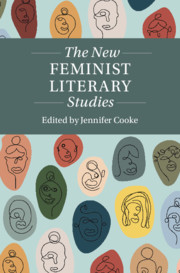Book contents
- The New Feminist Literary Studies
- Twenty-First-Century Critical Revisions
- The New Feminist Literary Studies
- Copyright page
- Contents
- Illustrations
- Contributors
- Introduction
- I Frontiers
- II Fields
- III Forms
- Chapter 11 Feminist Dwellings: Imagining the Domestic in the Twenty-first-century Literary Novel
- Chapter 12 Who Rules the World? Reimagining the Contemporary Feminist Dystopia
- Chapter 13 Transnational Feminism and the Young Adult Novel
- Chapter 14 Feminist Manuals and Manifestos in the Twenty-first Century
- Chapter 15 ‘This is not a memoir’: Feminist Writings from Life
- Chapter 16 Feminist Poetries of the Open Wound
- Bibliography
- Index
Chapter 14 - Feminist Manuals and Manifestos in the Twenty-first Century
from III - Forms
Published online by Cambridge University Press: 16 November 2020
- The New Feminist Literary Studies
- Twenty-First-Century Critical Revisions
- The New Feminist Literary Studies
- Copyright page
- Contents
- Illustrations
- Contributors
- Introduction
- I Frontiers
- II Fields
- III Forms
- Chapter 11 Feminist Dwellings: Imagining the Domestic in the Twenty-first-century Literary Novel
- Chapter 12 Who Rules the World? Reimagining the Contemporary Feminist Dystopia
- Chapter 13 Transnational Feminism and the Young Adult Novel
- Chapter 14 Feminist Manuals and Manifestos in the Twenty-first Century
- Chapter 15 ‘This is not a memoir’: Feminist Writings from Life
- Chapter 16 Feminist Poetries of the Open Wound
- Bibliography
- Index
Summary
Guides on being a feminist by writers such as Caitlin Moran are increasingly popular. This chapter contrasts these new feminist manuals with the recent resurgence of feminist manifestos. It examines common features in manuals by Moran, Laurie Penny, Roxanne Gay, Chamananda Ngozi Adichie, and Emer O’Toole, including their narrative tone and their reluctance to engage with the rich legacy feminist work that precedes them. Feminism, in these works, is an individual realisation rather than an encounter with history or a political change induced by reading or activism. In contrast, Sara Ahmed’s ‘Killjoy Manifesto’, the document ‘Xenofeminism: A Politics for Alienation’ by the collective Laboria Cuboniks, and the Trans Heath Manifesto by activists from Edinburgh Action for Trans Health, provide exciting points from which to think about collective action, showing solidarity, and the importance of feminist knowledge-sharing. The chapter concludes that feminist manuals fail to move feminist thinking forward, whereas the manifestos speak directly to the problems, challenges, and political opportunities of collective feminist action in the twenty-first century.
Keywords
- Type
- Chapter
- Information
- The New Feminist Literary Studies , pp. 194 - 207Publisher: Cambridge University PressPrint publication year: 2020

